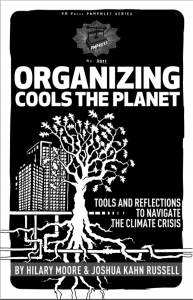I come from an incredibly liberal household in a very progressive area of the country. So, growing up I was always very aware of climate change and what it might mean for my future. I was raised to care about environmental issues and taught to make the connections between them and other issues in society, politics and the economy from an early age. Coming from this background I was always shocked and put off to hear how the issue of climate change challenged by unbelieving Americans. Until reading Merchants of Doubt, my first reaction was to blame their own ignorance and be angry with what I perceived as their apathy. However, I have come to see a different side of the story, one in which they were instead misguided by people they trusted to have the facts. I am still stunned and outraged by the people who spread misinformation as a tool for their own personal agenda but it is unfair to always accuse the listener.
Earlier this summer I read a booklet entitled Organizing Cools the Planet: Tools and Reflections to Navigate the Climate Crisis, and in it I found a quote that resonated. It said that too often, “Activists assume that because something is true, it will be meaningful to the people [they are] trying to reach. But In fact, the opposite is often the case: if something is meaningful, people believe it to be true” (26). The merchants of doubt in otherwise settled scientific matters were successful because they could tell a story that was easy to listen to and believe. However, going forward it is important for us, who know the facts, to give meaning to them in an accessible way. Climate change clearly cannot be tackled with only a handful of people and a few simple cures. The importance of giving the crisis a face and a narrative is crucial to create positive change, especially going forward into COP20.

